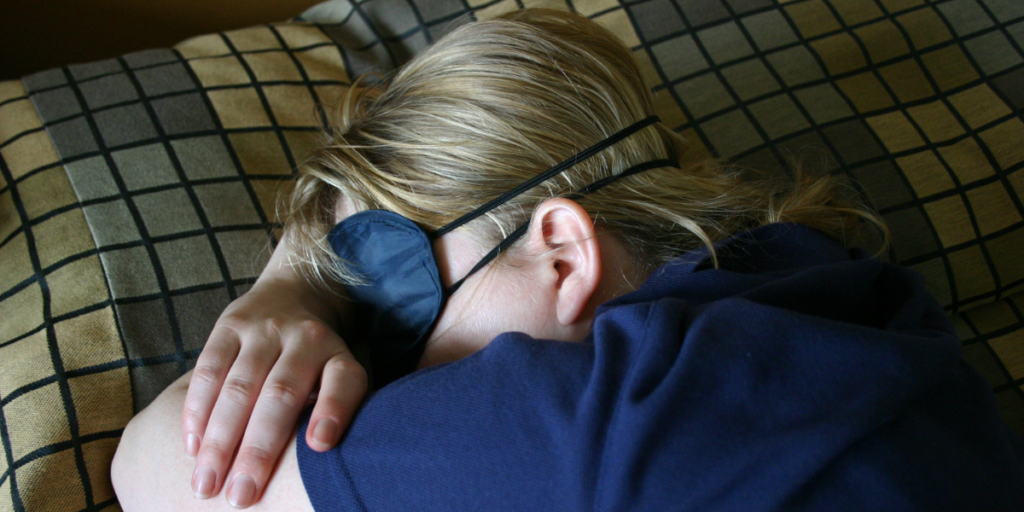Key Takeaways:
- Pre-Travel Preparation: Learn pre-flight steps to reduce jet lag, including schedule adjustments and hydration tips.
- In-Flight Techniques: Discover strategies like light exposure and sleep timing to ease your transition during the flight.
- Post-Arrival Recovery: Uncover effective post-arrival methods for adjusting to new time zones smoothly and naturally.
Arriving in a new time zone and feeling completely off-kilter? At Reposé, we recognize the impact of travel fatigue and the difficulty of bouncing back after a long trip. That’s why we specialize in innovative self-heating eye masks designed to relieve tired eyes, reduce stress, and offer relaxation with therapeutic warmth. With the right support tools, including our eye masks, adjusting to new environments can feel smoother and more restorative.
In this guide, we’ll explore actionable strategies to help you overcome jet lag and feel refreshed during your travels.
Understanding Jet Lag: What Causes It and How It Affects You
Jet lag occurs when your body’s internal clock, or circadian rhythm, is disrupted by traveling across multiple time zones. This internal clock helps regulate sleep, hunger, and alertness based on the natural light-dark cycle in your environment. When you suddenly change time zones, your body struggles to adapt to the new schedule, which can cause fatigue, insomnia, irritability, difficulty concentrating, and even digestive issues.
Jet lag symptoms tend to be worse when traveling east, as adjusting to a “shortened” day is often harder than extending the day when traveling west. The more time zones crossed, the longer it generally takes for your body to adjust, with some people needing a day or more per time zone. Understanding how jet lag works and why it affects you can help in choosing strategies to adjust more quickly.
Say goodbye to jet lag and hello to relaxation! Discover the soothing power of the Repose Heated Eye Mask – perfect for easing travel fatigue, promoting restful sleep, and creating an at-home spa experience wherever you are. Get yours today and enjoy instant comfort and relief on the go!
Pre-Travel Tips To Minimize Jet Lag
Preparing for jet lag before you even start your journey can make a big difference. Here are a few pre-travel strategies:
- Gradually Shift Your Schedule: A few days before departure, start adjusting your sleep and meal times to align more closely with the destination time zone. For example, if traveling east, try going to bed and waking up earlier each day; if going west, shift later.
- Stay Well-Rested: Starting your trip sleep-deprived makes jet lag harder to handle. Aim to get a full night’s sleep in the days leading up to travel to avoid accumulating a sleep debt.
- Hydrate Before You Fly: Air travel can be dehydrating, which can worsen jet lag symptoms. Start hydrating well before the flight by drinking water consistently throughout the day and avoiding alcohol and caffeine, which can disrupt sleep and dehydrate you.
- Plan Your Flight Timing Wisely: Whenever possible, choose flights that arrive in the afternoon or evening at your destination. This timing makes it easier to stay awake upon arrival and go to bed at a reasonable local time, aiding in a quicker adjustment.
- Pack for Comfort: Prepare items that can help you sleep on the plane, such as a neck pillow, eye mask, earplugs, or noise-canceling headphones. The more rest you get on the plane, the easier the adjustment process will be upon arrival.
Adjusting Your Schedule Before Departure
Preparing for a change in time zones can significantly reduce the impact of jet lag, helping you feel refreshed and ready to enjoy your destination sooner. By adjusting certain aspects of your schedule before you depart, you can ease the transition for your body’s internal clock. Here’s a guide on how to start acclimating to your destination’s time zone before you even board the plane:
Shift Your Sleep Schedule Gradually
To help your body adapt, begin shifting your sleep schedule by 30 to 60 minutes each day toward the destination’s time zone. If traveling eastward, try going to bed and waking up earlier each day. For westward trips, do the opposite by moving both your bedtime and wake-up time later. This incremental change eases your body into the new rhythm, reducing the shock of an abrupt time shift.
Adjust Meal Times
Adjusting meal times is another effective way to signal a new routine to your body. Begin eating meals at times that align with your destination’s time zone a few days before you leave. This adjustment helps synchronize your digestive processes with the new timezone, as your body’s internal clock is strongly influenced by regular activities such as eating.
Consider Light Exposure
Exposure to light is a crucial factor in regulating circadian rhythms, so adjust your light exposure accordingly. When traveling east, try to get morning sunlight or use a light therapy lamp to encourage an earlier sleep schedule. For westward travel, aim for exposure to evening light, which will help you stay alert longer and gradually prepare your body for later bedtimes in your destination.
Avoid Stimulants
As departure day approaches, reduce your intake of caffeine and other stimulants, especially in the afternoon and evening. Minimizing reliance on stimulants allows your body to adjust naturally without interference from artificial aids, leading to a more seamless adaptation to the new time zone.
In-Flight Strategies To Reduce Jet Lag Symptoms
During long flights, adopting specific in-flight strategies can go a long way in reducing jet lag symptoms, allowing you to arrive feeling more rested and prepared for the new time zone. By managing sleep, hydration, and activity levels, you can minimize the impact of jet lag and ease into your destination’s rhythm. Here are some effective in-flight approaches to consider:
Set Your Watch To The New Time Zone
As soon as you board, reset your watch or phone to match the time zone of your destination. This simple mental shift helps you start adapting to your destination’s schedule and serves as a useful guide for timing activities, such as meals and sleep, throughout the flight.
Stay Hydrated
The low humidity levels in airplane cabins can lead to dehydration, which worsens the symptoms of jet lag. Regularly drinking water throughout the flight can keep your body hydrated and reduce fatigue. To avoid dehydration and improve sleep quality, skip alcohol and caffeinated drinks, both of which contribute to dehydration and disrupt sleep patterns.
Time Your Sleep Wisely
Plan your in-flight sleep based on your arrival time. If you land in the morning, try to sleep on the plane to help you feel alert upon arrival. On the other hand, if you’ll arrive at night, it’s best to stay awake during the flight, allowing you to be tired enough to fall asleep once you arrive. To maximize rest, use items like earplugs, an eye mask, or noise-canceling headphones to create a relaxing sleep environment.
Move Around Regularly
Sitting for long periods can lead to muscle stiffness and fatigue, which can increase jet lag’s effects. Moving around the cabin periodically and performing light stretches help maintain circulation and prevent stiffness. These small movements improve blood flow, keeping you energized and better prepared for a restful sleep when it’s appropriate.
Eat Light
Heavy meals can contribute to feelings of sluggishness and discomfort, especially while seated for long durations. Opt for lighter meals and snacks that are easy to digest, which will help your body feel balanced and prevent lethargy. Eating light not only helps you stay comfortable but also aids in adjusting to a new schedule upon landing.
Post-Arrival Tips For Quick Time Zone Adjustment
Once you’ve arrived at your destination, there are practical steps you can take to adjust quickly to the new time zone:
- Get Exposure to Natural Light: Sunlight is one of the most effective ways to reset your internal clock. Spend time outdoors in the sunlight, especially in the morning, to signal your body to adjust to the new day-night cycle. If you arrive at night, try to keep the environment dim to prepare for sleep.
- Stay Awake Until Local Bedtime: No matter how tired you are, try to stay awake until a reasonable bedtime in the local time zone. Engaging in light activities or exploring the area can help you stay alert. If you need to nap, keep it short (20-30 minutes) to avoid disrupting your sleep schedule.
- Eat According to Local Mealtimes: Eating at local times can help your body adjust to the new routine. Opt for nutritious, balanced meals that can help sustain your energy, and avoid heavy meals close to bedtime to promote better sleep.
- Keep Yourself Active: Physical activity can boost energy levels and help combat the sluggishness associated with jet lag. Light exercise, such as a short walk or gentle stretching, can also help you sleep better at night.
- Avoid Stimulants Close to Bedtime: Limit caffeine intake in the afternoon and evening, as it can interfere with sleep. Try herbal teas or other caffeine-free options if you’re looking for a warm drink before bed.
Natural Remedies And Lifestyle Adjustments
Using natural remedies and lifestyle adjustments can help ease the effects of jet lag without resorting to medications. By focusing on sleep-supportive supplements, relaxation techniques, and mindful dietary choices, you can aid your body’s natural ability to adapt to a new time zone. Here are several effective methods to consider:
Melatonin Supplements
Melatonin, a natural sleep-regulating hormone, can be especially beneficial when adjusting to a new time zone. Taking a small dose about an hour before your intended bedtime can help signal your body that it’s time to rest, easing the transition into the new sleep schedule. To determine the most effective dose and timing, consult a healthcare provider to tailor the supplement to your specific needs.
Herbal Teas For Relaxation
Sipping herbal teas like chamomile, valerian root, or lavender in the evening can create a soothing bedtime ritual, promoting calmness and easing you into sleep. These teas contain compounds that relax the nervous system, supporting a restful transition to sleep without causing next-day grogginess. By incorporating these teas into your routine, you may find it easier to unwind and prepare for a good night’s sleep.
Aromatherapy
Using essential oils like lavender, sandalwood, or chamomile can encourage relaxation and prepare your body for rest. Adding a few drops to a diffuser or applying the oils to a sleep mask allows their calming scents to signal bedtime to your brain, enhancing sleep quality and duration. This gentle approach can support deeper rest, making it easier to adjust to a new time zone naturally.
Mindfulness And Relaxation Techniques
Practices such as deep breathing exercises, meditation, or gentle yoga can effectively reduce pre-sleep tension, calming the nervous system and helping you ease into a restful state. These techniques prepare your body and mind for sleep by lowering stress and encouraging relaxation. Incorporating a short mindfulness session before bed can improve sleep onset, helping combat jet lag symptoms more smoothly.
Dietary Adjustments
To improve sleep quality, avoid heavy or rich foods close to bedtime, as they can hinder restfulness. Instead, opt for light snacks containing sleep-promoting nutrients like tryptophan, magnesium, or calcium—found in foods such as nuts, bananas, or yogurt—which aid natural sleep rhythms. This mindful approach to eating can support your body’s natural sleep cues, helping you acclimate to your destination’s time zone more comfortably.
When To Seek Medical Advice For Severe Jet Lag Symptoms
In most cases, jet lag is a temporary inconvenience that improves with time. However, if symptoms are severe, persistent, or significantly interfere with your daily activities, it may be worth consulting a healthcare provider. Here are some situations where medical advice might be beneficial:
- Persistent Insomnia or Fatigue: If you experience prolonged insomnia or excessive fatigue that doesn’t improve after a week or more, it could indicate an underlying sleep disorder or difficulty adapting that may benefit from professional intervention.
- Mood Changes and Cognitive Impairment: Jet lag can sometimes lead to mood swings, irritability, or issues with concentration. If these symptoms are severe or do not improve with typical jet lag remedies, it’s worth discussing them with a healthcare provider to rule out other causes.
- Dependence on Sleep Aids: Frequent use of sleep aids or medications to manage jet lag symptoms can indicate a more serious issue with sleep regulation. Consulting a medical professional can help determine a healthier, long-term strategy for managing time zone adjustments.
- Underlying Health Conditions: For those with health conditions that affect sleep, energy levels, or mood (such as chronic fatigue syndrome or depression), jet lag can exacerbate symptoms. A healthcare provider can offer personalized recommendations to make the adjustment process smoother and more manageable.
Final Thoughts
Jet lag is a common but manageable challenge for travelers adjusting to new time zones. By understanding how your body’s internal clock works and implementing a few proactive strategies, you can minimize the discomfort and adapt more quickly to your destination’s time. Simple steps—like adjusting your schedule before travel, staying hydrated, managing light exposure, and using natural remedies—can make a significant difference in how quickly you recover.
Remember, jet lag is temporary and affects each person differently. By being patient with the adjustment process and giving your body the support it needs, you can enjoy a smoother transition and make the most of your travels. And if you ever find that jet lag symptoms are too severe or prolonged, don’t hesitate to seek medical advice for tailored support.
Read also:
- Why Green Tea Is the Secret Ingredient for Flawless Skin
- Wake Up to Softer Lips: How Lip Sleeping Masks Work
- The Benefits of Melatonin Gummies for Kids with Sleep Challenges
Frequently Asked Questions About Dealing With Jet Lag
What are the main symptoms of jet lag?
Common symptoms include difficulty sleeping, daytime fatigue, irritability, difficulty concentrating, and digestive issues. These symptoms vary depending on the number of time zones crossed and personal health factors.
Does jet lag affect everyone the same way?
No, jet lag varies by individual. Age, sleep habits, travel direction, and even lifestyle play a role in how severely someone may experience jet lag.
How many time zones can you cross before jet lag becomes an issue?
Jet lag is generally noticeable when crossing at least three time zones. The more zones you cross, the more likely you are to experience symptoms.
Is it easier to adjust when traveling east or west?
Traveling west is often easier for most people as it extends the day. Traveling east, which shortens the day, tends to cause more severe jet lag.
Can certain foods or drinks worsen jet lag symptoms?
Yes, alcohol and caffeine can worsen jet lag by disrupting sleep. Heavy meals close to bedtime can also hinder restful sleep and digestive comfort.
How long does jet lag last?
Recovery time varies, but a general rule is that it takes about one day per time zone crossed. This can be shorter for westward travel or with effective strategies.
Are there any long-term effects of jet lag?
Jet lag itself is temporary. However, frequent travelers may find that poor sleep patterns become ingrained over time if they don’t take steps to manage jet lag consistently.
Is it safe to use melatonin to manage jet lag?
Yes, melatonin is generally safe in small doses to help adjust sleep cycles. It’s recommended to consult a healthcare provider for proper dosage and timing.
Can children experience jet lag?
Yes, children experience jet lag just like adults but may show it through fussiness or unusual sleep patterns. Gradual adjustments and natural light exposure can help children acclimate.
Does using a heated eye mask help with jet lag symptoms?
Heated eye masks, like those from Reposé, provide relaxation and can reduce stress and eye strain, helping you unwind, especially if you’re trying to sleep in an unfamiliar environment.
Sources:
- Reilly, T., Atkinson, G., Edwards, B., Waterhouse, J., Åkerstedt, T., Davenne, D., Lemmer, B., & Wirz-Justice, A. (2007). Coping with jet-lag: A Position Statement for the European College of Sport Science. European Journal of Sport Science, 7(1), 1–7. https://doi.org/10.1080/17461390701216823
- Loat, C. E. R., & Rhodes, E. C. (1989). Jet-Lag and Human Performance. Sports Medicine, 8(4), 226–238. https://doi.org/10.2165/00007256-198908040-00003
- Forbes-Robertson, S., Dudley, E., Vadgama, P., Cook, C., Drawer, S., & Kilduff, L. (2012). Circadian Disruption and Remedial Interventions. Sports Medicine, 42(3), 185–208. https://doi.org/10.2165/11596850-000000000-00000
- Therapies, A., & Mar/. (2004). of Arizona. (Altern Ther Health Med. 10(2), 60–63. https://cam.cochrane.org/sites/cam.cochrane.org/files/uploads/Caspi_2004_ATHM_CAM%20Field%20Commentary%20Column%20on%20melatonin%20for%20prevention%20and%20tx%20of%20jet%20lag.pdf
- team, N. editorial. (2024, October). Jet Lag Supportive Therapy: Effective Strategies for Rapid Recovery. NeuroLaunch.com. https://neurolaunch.com/jet-lag-supportive-therapy/










